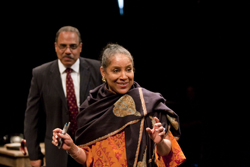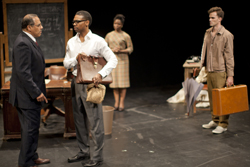By Barbara Smith
Staff Writer

Audiences appreciate projects that explore character and bring the humanity of the subject into full view. And for Phylicia Rashad, this ability to tell a very human story in a very moving way is at the heart of Michael Benjamin Washington’s “Blueprints to Freedom: Ode to Bayard Rustin,” which she is directing at the La Jolla Playhouse. The project is part of the Playhouse’s DNA New Work Series, a 2-week run of workshops and readings, taking place now through March 2. With the historic 1963 March on Washington as a backdrop, the workshop explores the pivotal and complex role civil rights activist Bayard Rustin played in orchestrating this landmark event.
Rashad is a Tony Award-winning actress, singer and director, perhaps best known for her role as the iconic Clair Huxtable on “The Cosby Show.” The multi-faceted artist is always looking for new, groundbreaking creative opportunities. This project, which teams her with Washington and an accomplished ensemble of actors, is enormously satisfying for her. “Michael Benjamin Washington is an extraordinary artist,” she says, “a gifted playwright, actor and musician.” She first met Washington in New York where they are both part of the Broadway Inspirational Voices, a diverse choir of professional performers who present concerts and outreach efforts to promote the arts. The two later connected in Los Angeles when Rashad was directing August Wilson’s “Joe Turner’s Come and Gone,” and the young actor/playwright, who was in the audience, approached her to direct his play. Eager to team with Washington and the Playhouse’s new play development initiative, she agreed. And, while the project is currently in the workshop stage—it began as a reading at the La Jolla Playhouse last August on the anniversary of the 1963 March on Washington and has grown from there–she has high hopes that it will find its way to a full production.
Rashad’s voice is vibrant as she speaks from the La Jolla Playhouse on Thursday where the workshop was putting on the final touches before its opening performance. What is it that brings her the most joy from directing? “I love collaboration,” she offers without hesitation. “I thrive on it. When you collaborate with people, you learn. It’s holding a vision and galvanizing all of the creative energies involved to move in alignment with that vision, leaving room for each to present something that had not been considered before.”
Interestingly, Rashad never set out to become a director. “I never saw myself in those terms,” she reflects. But advice from acclaimed director Geoffrey Holder early in her career when she played a munchkin in “The Wiz” proved to be visionary. “He told us that every dancer should think of becoming a choreographer and every actor should think of becoming a director…He planted that seed and life ordered it.” The critically-acclaimed artist has been honing her directorial skills since 2004 when she made an auspicious debut at the Seattle Repertory Theatre with August Wilson’s “Gem of the Ocean.” From there, her new role has flourished with successful runs throughout the country directing, among others, “Fences,” “Joe Turner’s Come and Gone,” “Immediate Family,” and “A Raisin in the Sun.”

Rashad is intrigued by Benjamin’s treatment of a pivotal figure in history whose legacy is still not fully known. Bayard Rustin’s name does not immediately come to mind when we think of the historic 1963 March on Washington, although he was Dr. King’s chief advisor in organizing the March. Rustin was a trailblazing leader in civil rights and non-violence, who is reputed to have introduced Dr. King to the teachings of Mahatma Gandhi. A Quaker, he was also an openly gay man, a minority within a minority. Thus the politics of that era placed him in the middle of a firestorm of controversy within and outside the black community, including Congressman Adam Clayton Powell Jr. describing Rustin as an “immoral element” in the movement. Rustin’s struggle to restore his standing and for his own spiritual redemption makes for a sensitive and affecting play, says Rashad. “It’s well-written and a very human play. It honors who he was and what he did.” Rashad suggests the notion of grace as a way to understand Rustin’s journey. “So many things happen by grace. Great things happen by grace. Turning points happen by grace. Restoration is a gift of grace. Redemption is grace itself.” In an act that some might call grace, last August, President Barak Obama awarded the Presidential Medal of Freedom, the highest civilian honor for an American, posthumously to Bayard Rustin.
Rashad is buoyed by the opportunity to be on the ground floor with new work and to promote new talent. “There are so many brilliant people who are not known,” she says. “And room should be made for them. When we were casting “Fences,” I was told I could extend offers to anyone I wanted. I said, ‘No, let’s audition, let’s see who we can find.’ We found the most brilliant actors, many of whom I had never seen or heard of. There is so much talent, so many gifted people. I love what I do and am grateful to be able to do it.”
The cast of “Blueprints to Freedom: An Ode to Bayard Rustin” features Michael Benjamin Washington (Playhouse’s “Memphis,” “The Wiz”); Nija Okoro (TV’s “ER,” “Southland”); Jeremy Shranko (SCR’s “The Groundling”); UC San Diego M.F.A. graduate Jacques C. Smith (Broadway’s “Rent”); and James A. Watson, Jr. (“Halls of Anger,” South Coast Rep’s “Death of a Salesman”).
The workshop has six public performances through March 2. In addition, The DNA New Work Series features six free 1-day readings. For information, call (858) 550-1010 or visit www.lajollaplayhouse.org.

